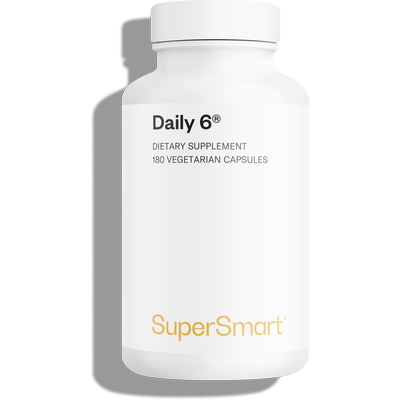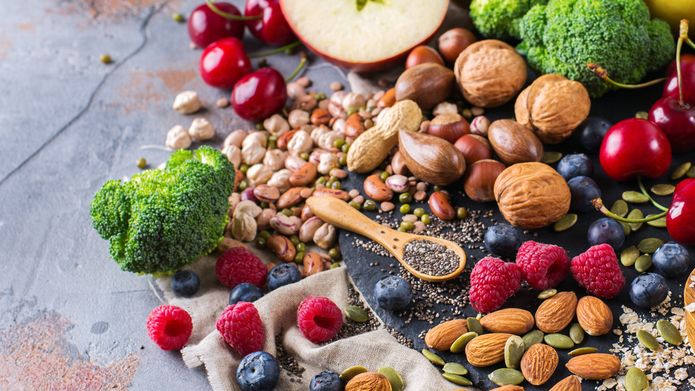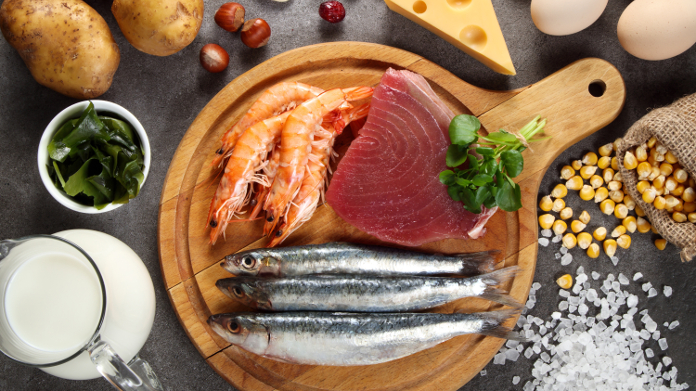Recent survey shows global micronutrient deficits
A global survey published in 2024 reveals that a large proportion of the population suffers from deficiencies in several essential micronutrients.

More than half the world's population affected by micronutrient deficiencies
A major study published in August 2024 in the journal The Lancet Global Health used databases provided by 31 countries to compare the theoretical needs and actual nutritional intakes of people in 185 countries around the world (1). The subjects were divided into different sub-groups according to their sex and age bracket (5-year intervals between 0 and 80 years of age, plus an ‘80 and over’ category). The researchers focused on 15 essential vitamins, minerals and trace elements that determine physical and mental fitness: vitamins A, B1 (thiamine), B2 (riboflavin), B3 (niacin), B6, B9 (folate), B12, C and E, as well as calcium, iron, iodine, magnesium, selenium and zinc.
The conclusions are worrying, to say the least. Based on strictly dietary intakes (excluding supplements and fortified products), researchers estimate that more than 5 billion people worldwide are not consuming enough of the following: iodine (68% of the population), vitamin E (66%) and calcium (66%). The same is true of iron, which 65% of the population consume in insufficient quantities, as well as vitamins B2 (55%), B9 (54%) and C (53%).
For the same country and age group, there are clear disparities between the sexes. More women than men have inadequate intakes of iodine, iron, selenium and vitamin B12. Conversely, men are more likely to have inadequate intakes of magnesium, zinc, vitamins A, B1, B3, B6 and C.
There are also trends specific to certain regions of the world, linked to cultural and economic factors. Calcium deficiencies, for example, are more marked in South and East Asian countries and in sub-Saharan Africa, where traditional diets include little or no dairy products. Despite easier access to quality foodstuffs, Western countries do not seem to be spared, as a result of the transition to a more processed and impoverished 'modern' diet. In Europe and Central Asia, in particular, the theoretical requirements for vitamin E are generally not being met by the over-15s.
Nutritional deficiencies around the world: what are the causes?
The increase in nutritional deficiencies around the world is directly linked to the quality of our diet. It is difficult, if not impossible, to achieve the recommended daily intake of micronutrients with meals that are unbalanced, insufficiently diversified, or composed mainly of nutritionally poor foods (ready meals, sweets, soft drinks, etc.).
If we hope to cover our theoretical needs, we should instead adopt a varied diet, giving priority to whole foods (fruit, vegetables, wholegrain cereals, pulses, poultry, fish, nuts, etc.) in order to benefit from the widest possible range of vitamins, minerals and trace elements (2).
However, achieving this ideal represents a major challenge, given the inequalities in access to food around the world. It is also challenged by our current lifestyles, which have profoundly altered our eating habits, including a lack of time to cook, chronic stress leading to less healthy choices, and the profusion of ultra-processed foods in supermarkets (3-4), etc.
How can we avoid these nutritional deficiencies?
As mentioned above, preventing micronutrient deficiencies is intrinsically dependent on the availability of foods of high nutritional quality. For those who can, it is therefore advisable to maintain a balanced diet on a daily basis, drawing on all the major food groups and eating as wide a variety of foods as possible.
Once again, when conditions allow, food supplements can be used to top up intakes of essential vitamins, minerals and/or trace elements that would otherwise remain insufficient. In view of the results observed in the West, targeted monosupplementation with vitamin E (which helps protect cells against oxidative stress) would be of some relevance (5).
![]() Discover Natural E 400, a natural and powerful form of vitamin E (D-alpha tocopherol).
Discover Natural E 400, a natural and powerful form of vitamin E (D-alpha tocopherol).
Iron also appears to be lacking in the diet of menstruating women in Europe and Central Asia (6).
![]() Iron Bisglycinate is based on a form of iron that is bioavailable and very well tolerated by the digestive system.
Iron Bisglycinate is based on a form of iron that is bioavailable and very well tolerated by the digestive system.
Multivitamin supplements, which combine a broader spectrum of micronutrients in a single formula, are still the best option for those who want to maximise their intake easily and effectively by covering their overall daily requirements.
![]() Daily 3® brings together 45 exceptional nutrients, including 16 vitamins and 9 minerals in natural, active forms.
Daily 3® brings together 45 exceptional nutrients, including 16 vitamins and 9 minerals in natural, active forms.
![]() With 32 nutrients, Daily 2® is based on a sustained-release mechanism more in line with natural physiological processes, providing a continuous supply of micronutrients throughout the day.
With 32 nutrients, Daily 2® is based on a sustained-release mechanism more in line with natural physiological processes, providing a continuous supply of micronutrients throughout the day.
![]() An 'enriched' version of Daily3®, Daily 6® combines 54 natural ingredients, including notable compounds not found in standard supplements (resveratrol, green tea extract, PQQ, etc.).
An 'enriched' version of Daily3®, Daily 6® combines 54 natural ingredients, including notable compounds not found in standard supplements (resveratrol, green tea extract, PQQ, etc.).
SUPERSMART ADVICE
References
- Simone Passarelli, Christopher M Free, Alon Shepon, Ty Beal, Carolina Batis, Christopher D Golden, Global estimation of dietary micronutrient inadequacies: a modelling analysis, The Lancet Global Health, Volume 12, Issue 10, 2024, Pages e1590-e1599, ISSN 2214-109X, https://doi.org/10.1016/S2214-109X(24)00276-6
- Chaudhary V, Saraswathy KN, Sarwal R. Dietary diversity as a sustainable approach towards micronutrient deficiencies in India. Indian J Med Res. 2022 Jul;156(1):31-45. doi: 10.4103/ijmr.ijmr_3314_21. PMID: 36510896; PMCID: PMC9903373.
- Jabs J, Devine CM. Time scarcity and food choices: an overview. 2006 Sep;47(2):196-204. doi: 10.1016/j.appet.2006.02.014. Epub 2006 May 15. PMID: 16698116.
- Yau YH, Potenza MN. Stress and eating behaviors. Minerva Endocrinol. 2013 Sep;38(3):255-67. PMID: 24126546; PMCID: PMC4214609.
- Traber MG. Vitamin E inadequacy in humans: causes and consequences. Adv Nutr. 2014 Sep;5(5):503-14. doi: 10.3945/an.114.006254. PMID: 25469382; PMCID: PMC4188222.
- Fernandez-Jimenez MC, Moreno G, Wright I, Shih PC, Vaquero MP, Remacha AF. Iron Deficiency in Menstruating Adult Women: Much More than Anemia. Womens Health Rep (New Rochelle). 2020 Jan 29;1(1):26-35. doi: 10.1089/whr.2019.0011. PMID: 33786470; PMCID: PMC7784796.
- Blumberg JB, Bailey RL, Sesso HD, Ulrich CM. The Evolving Role of Multivitamin/Multimineral Supplement Use among Adults in the Age of Personalized Nutrition. Nutrients. 2018 Feb 22;10(2):248. doi: 10.3390/nu10020248. PMID: 29470410; PMCID: PMC5852824.
2 Days
very good expereince
very good expereince
Jelena Đaković
2 Days
Very good products.
Very good products.
Agnes BENDSAK
4 Days
Just OK
Just OK, ordering from company for many years and being safisfied
Lynn Mae
5 Days
Recomendo
Produtos encomendados são recebidos atempadamente e de acordo com o anunciado! Muito satisfeita!
Carla Sofia
5 Days
Everything is great!
Everything is great!
Jonas
10 Days
The delivery was fast and the product…
The delivery was fast and the product is great
SOMMARIVA Gianni
12 Days
Great service and lots of information
Great service and lots of information
Gabi
15 Days
Service Satisfaction
I’m satisfied with the service; it fulfilled what it set out to do.
Anfhony Abreu
17 Days
Original product and fast delivery
Original product and fast delivery. I haven't started it yet, but will do soon.
Vincenza Catania
20 Days
Good quality
Good quality. Good service.
Leonel Guzman
22 Days
Top!!!!!!!!
Top!!!!!!!!
Michael
24 Days
Excellent!
Products are great and delivered fast!
PARDINI Debora
25 Days
From order to receive the product
From order to receive the product, the process is smooth & fast. It’s good to customers.
WONG Mei Ling
26 Days
Fast delivery
very quick delivery to italy. product is good.
Customer
27 Days
Prompt delivry !!👍
Prompt delivry !!👍
SWEET Christine
of experience
your money back
##montant## purchase






